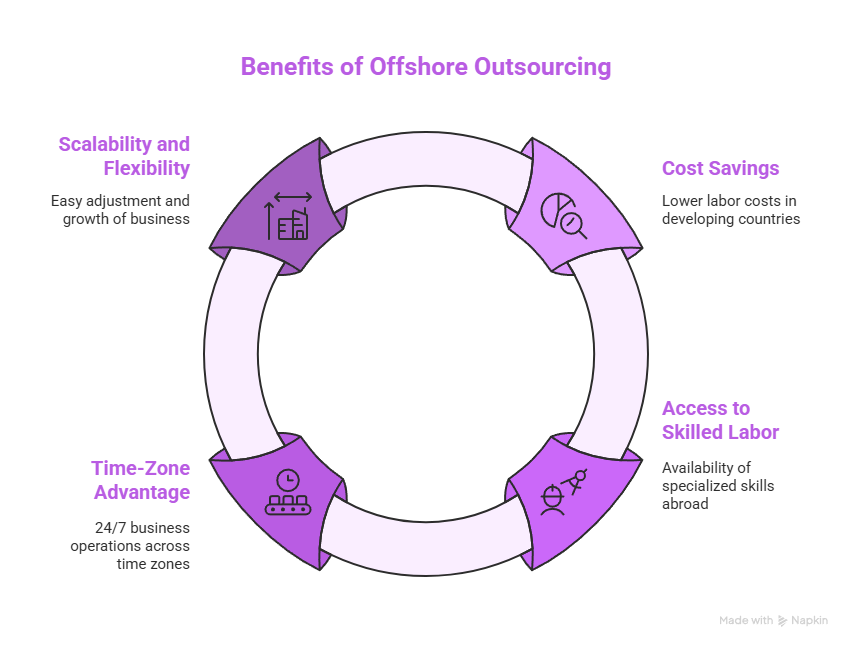Offshore Outsourcing: The Ultimate Guide
26 Jun 2023 By: Michael Kansky
Updated
Today’s global business landscape sees offshore outsourcing as a key strategy for growth. Companies partner with global talents to cut costs, tap into skilled labor, and boost productivity with round-the-clock operations. Yet, such global teamwork brings challenges like cultural clashes and communication hurdles. In this article, we explore offshore outsourcing’s benefits and drawbacks, and how to use it to drive growth and innovation in your business.

Many US businesses, about two-thirds, are hiring overseas help. It’s crucial for any business to understand what this means for them. We’re discussing the pros and cons of global teams, offering advice and options. Stay with us, and we’ll help determine if going global is right for your business. It’s like deciding whether to expand your team internationally.
Understanding Offshore Outsourcing
Outsourcing core competencies helps businesses thrive by allowing them to focus resources elsewhere while maintaining product or service quality. This strategy frees up time and resources by delegating tasks to external organizations.
In business, getting help from other companies can be local (onshore), from neighboring countries (nearshore), or from distant places (offshore). It’s like having local, neighbor, or pen-pal friends to help your business grow.
Digital transformation is reshaping business operations, creating opportunities to outsource non-core tasks. This allows businesses to seek overseas help for activities such as:
- Technology services
- Operating procedures
- Computer science and software development services
- Customer service
- Accounting
- Marketing
- Virtual assistants
- Human resources
Advantages of Offshore Outsourcing

Hiring from abroad offers unique benefits to businesses that might not be immediately clear. Companies that specialize in taking care of business tasks from afar can really polish up the main things your business does. This lets business owners tap into benefits like:
- Cost savings: Bringing in new team members from countries that are growing economically can save a lot of money because the pay rates are often lower there.
- Access to skilled labor: Hiring from abroad lets you meet people with cool skills that might be rare back home. Skilled people are all set to make your business sparkle.
- Time-zone advantage: With a team spread out across the globe, your business can keep buzzing 24/7, beyond the usual workday. Plus, it’s a cool way to connect with people and opportunities in far-off places, as if your business is making new friends all around the world, any time of day.
- Scalability and flexibility: Outsourcing work to other countries makes it easier to adjust and grow your business. It’s like having a team that can easily move and adapt, helping you manage everything more smoothly.
Nowadays, teaming up with folks from overseas is super easy and pretty exciting. It’s a chance to save some cash while teaming up with skilled experts, giving your business a real boost. Think of it as a secret ingredient for your business to grow bigger and better.
Challenges and Risks of Offshore Outsourcing
Outsourcing paperwork abroad can help but also brings problems that may slow your business down.
- Language and cultural barriers: Working with a team overseas can be challenging. Simple misunderstandings can lead to big problems, from minor delays to losing business. It’s like a game of global telephone, where messages can easily get mixed up.
- Quality control: Ensuring quality with distant developers is tough because you can’t easily oversee their work. It’s like trying to guide a project from afar without seeing what’s going on.
- Legal regulations: Companies must learn foreign rules to avoid legal trouble, like knowing the rules of a game to avoid mistakes.
- Geopolitical and economic risks: Outsourcing work to other countries might bring financial risks or even political troubles. Keeping your team closer to home could help dodge these problems. It’s like choosing a familiar path to avoid unexpected bumps.
Remember to think about the tricky parts of teaming up with a business from far away. It’s like planning a long-distance friendship; there are going to be some hurdles to figure out.
Trending Now
Offshoring is a global trend where businesses cut costs by hiring skilled workers from abroad for roles like IT support and web design. It offers cost savings but comes with challenges like data security risks, unexpected costs, quality issues from cultural differences, communication barriers, and technical gaps. Companies also face legal and time zone challenges to keep operations smooth. Understanding and managing these issues is key to effectively benefiting from offshoring.
Selecting best Offshore Outsourcing Partner
Businesses choosing an offshore vendor should be careful and consider key elements that will determine the partnership’s effectiveness:
- Communication: Clear chat with the overseas team is crucial to avoid confusion, especially on how things are managed. It’s important their culture and language vibe with yours, kind of like making sure you and a friend from far away understand each other well.
- Certifications: Check that your overseas partners are up to mark with quality and skills. If they don’t cut it, better to pass. It’s like choosing a dependable friend for a team game.
Commitment to information privacy standards: An offshore partner should focus on data security and intellectual property rights.
Top Offshore Outsourcing Locations
Businesses can choose from many places around the world for offshoring. Some countries are experts in specific business tasks. Here are a few places known for being great at offshoring:
- India: India is a top choice for anything related to data and software. It’s perfect for businesses looking to outsource their IT work.
- The Philippines: The Philippines is the go-to for call centers, which makes it an excellent place for outsourcing customer service. It’s also a smart pick for financial tasks and business process work.
- Eastern Europe: With skilled laborers in software development, Ukraine and Poland are popular choices for information technology outsourcing. These countries also lack certain taxes and tariffs, making them attractive to many foreign businesses.
- Latin America: Mexico and Brazil are becoming popular for offshoring, thanks to their good labor prices, skilled software developers, and top-notch engineers. It’s like discovering new, promising players for your team.
Your business has a lot of places to consider for outsourcing. American companies often go for India or other places in Asia. But you’ve also got options like the Philippines, Eastern Europe, or Latin America. Think about these spots when looking for the perfect team to join your business adventure.
Examples of Offshore Outsourcing
Offshoring can help businesses from a variety of industries. Many well-known companies have practiced offshore outsourcing, including the following:
- Microsoft: As the top software giant, Microsoft teams up with Indian companies for a lot of its testing work.
- United Airlines: United Airlines, flying worldwide, fills many management jobs with team members in India.
- Apple: Like Microsoft and United Airlines, Apple turns to India for help, especially for customer technical support.
Outsourcing work abroad can cut costs for businesses. Many big US companies hire offshore workers for tasks like making products, managing teams, and helping customers. Setting up a nevis trust can further enhance privacy and protection in offshore outsourcing.
Best Practices for Successful Offshore Outsourcing
How you start and look after your outsourcing partnership really matters for its success. Here are some top tips:
- Remember, getting ready and staying in touch with your overseas team is key. These steps are what make outsourcing work well.
- Building good ways to talk and checking in often will help you handle any bumps in the road. This makes it easier for your local team and your overseas partners to work together towards common goals.
- Make room for your team and the partner company to work together. This will help keep everything running smoothly.
- Keep an eye on how your partner company is doing by using clear measures. This can help them get better at what they do.
What is the cost of offshore outsourcing?
The cost of outsourcing varies based on the type of help needed, project size, task complexity, and desired quality. Labor costs dominate the expenses, and the location of your outsourcing partner significantly affects the price. Typically, companies save around 30-60% by hiring overseas.
Hiring workers from countries like India, China, and the Philippines can be cost-effective but may include challenges. Language barriers and extra communication can increase costs. Travel expenses for meetings add further costs. Finding skilled professionals might require higher pay, especially for complex tasks. The more difficult the job, the higher the cost.
Offshore outsourcing FAQ
Key Takeaways
Conclusion
Picture our vast, interconnected world as a treasure map, and the secret to improving your business might lie far across the seas. Thinking about outsourcing work overseas? It’s like embarking on an adventure that could save money and streamline daily operations. It’s like discovering the missing puzzle piece that makes your business picture clear and vibrant.
Whether offshore or onshore, it’s crucial to strategize and oversee customer service carefully. Ready to take on this challenge? Our virtual assistants and 24/7 customer service team are at your service to manage your back-office tasks and customer support. This frees up your time to concentrate on what’s truly important. Starting at just $8 per hour, our bilingual agents are ready to elevate your efficiency. Talk to us today and experience the difference with HelpSquad BPO.


